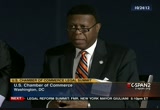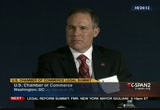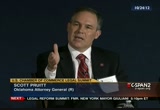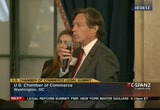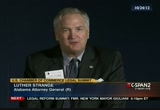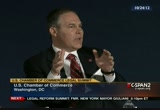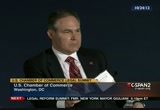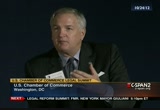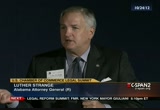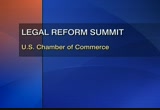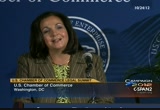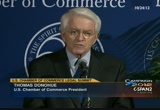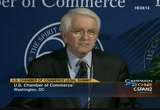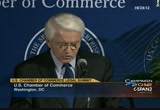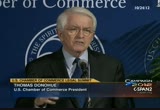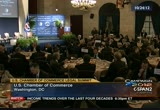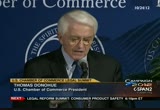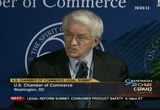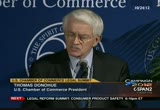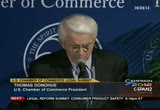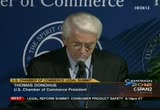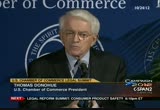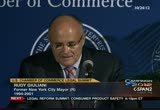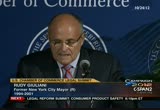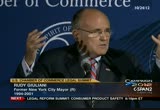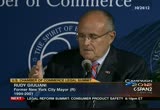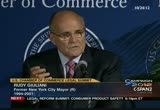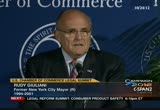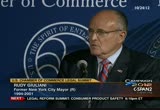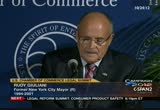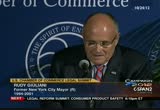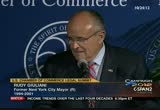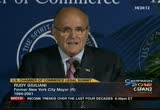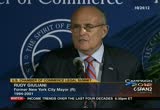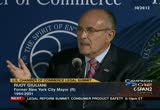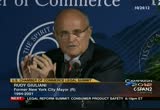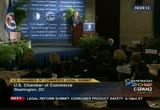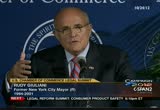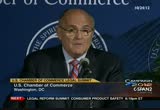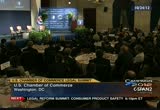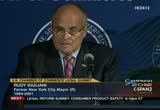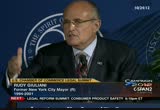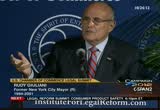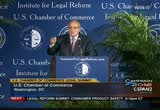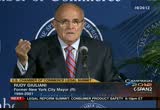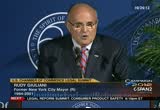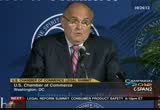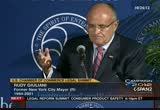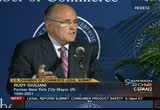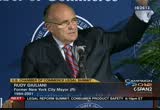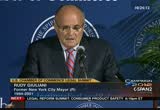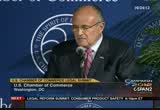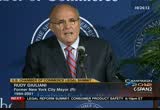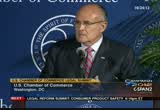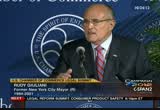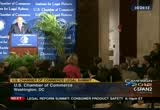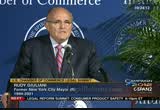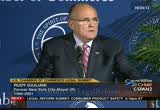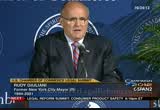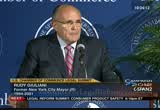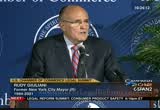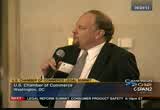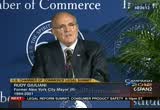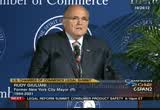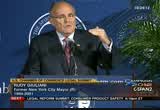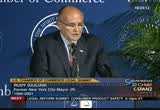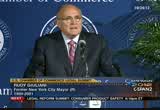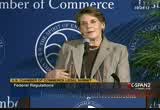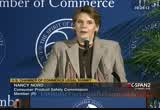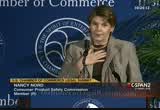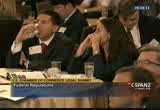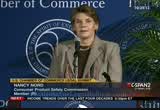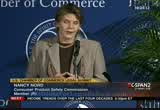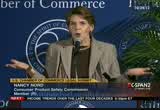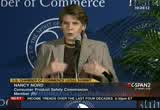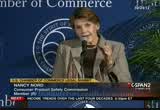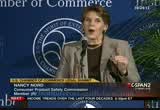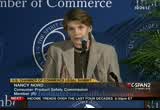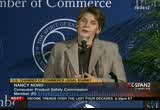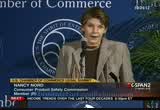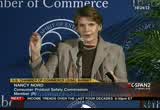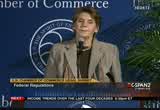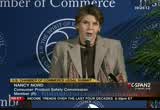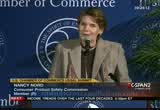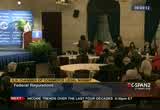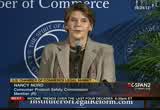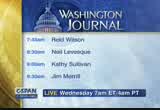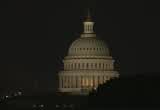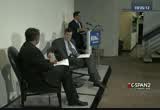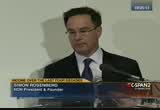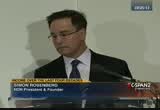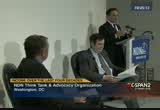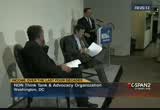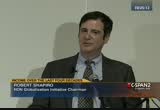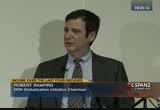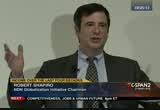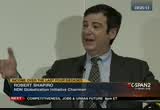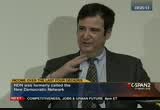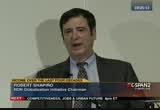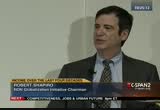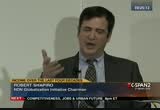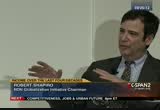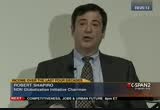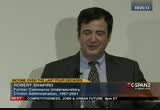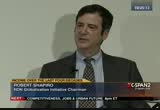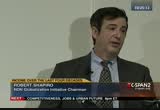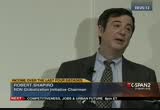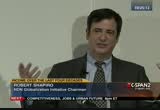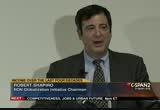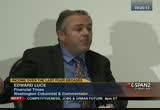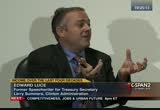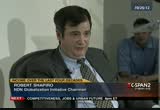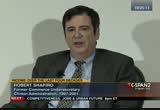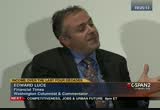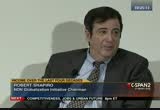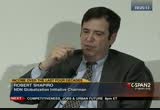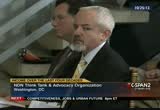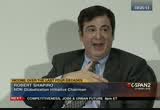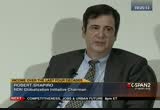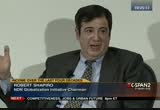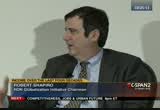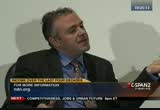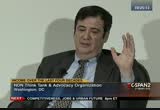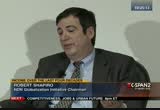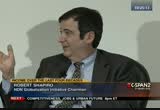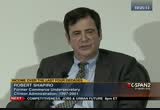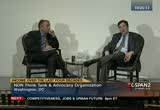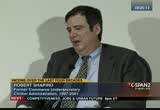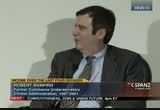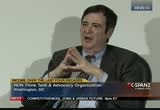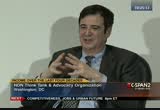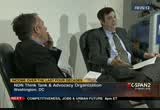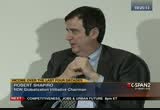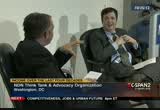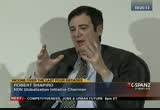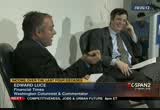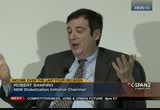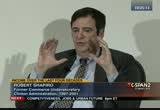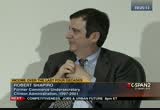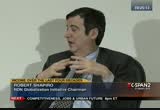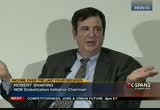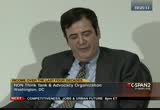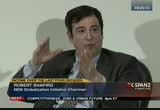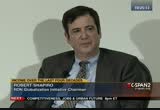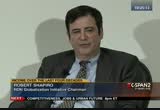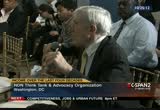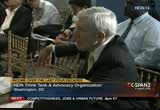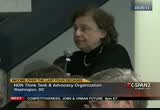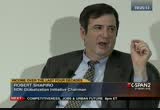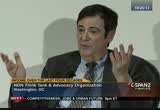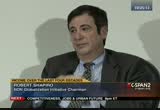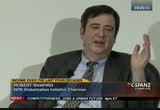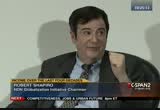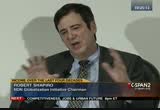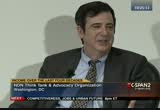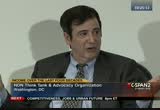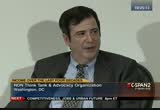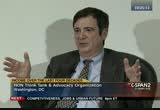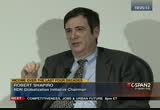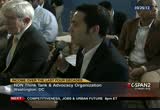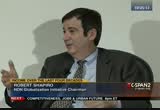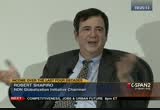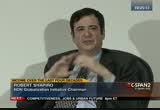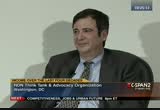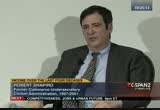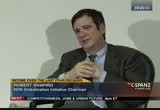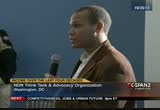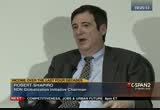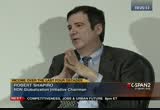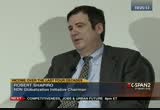tv U.S. Senate CSPAN October 30, 2012 5:00pm-8:00pm EDT
5:00 pm
5:01 pm
decision made by the state of oklahoma. there is a responsibility vested in each state in this country to make a decision presently about whether they adopt a state health care exchange, and there are factors that drive that. there are reasons to do that. there are reasons not to do that, but we ought to play by the rules that have been set up by the affordable care agent so the state can make a formal decision. if we adopt x, the benefit would be want? the feds wouldn't force upon the state of oklahoma a health care exchange, but if you don't implement a health care exchange, the affordable care act is clear in its language here's what flows from that. the irs disregarded that. they acted in a way that's inconsistent with the apa by adopting this rule on may 18th. it's the state's responsibility, and there may be other states that join this because, again, 20 # or so states have not adopted an exchange. it's about preserving the
5:02 pm
ability of the state to decide what's best for the citizenry, and as we defend and prosecute that, agencies at the federal level comply with the plain reading of the statute. agencies are set up to do what? last i checked, administer laws passed by congress. i think there's an open question whether they are doing that consistently across the board whether it's an energy space, environmental space, ect.. it's our job as attorneys general to participate in that transaction is preserved. that's why we filed a lawsuit. we'll see where it heads. it's less about the tax breaks for those corporations. it's more about what responsibility and opportunity has been vested in the state by the affordable care act in preserving that as a stake holder. >> i'm lee parsely with outside
5:03 pm
lawyer protection for lawsuit reform. in texas, there's a number of statutes that allow attorney general to have multiple violations. for a company that has inadvertently vollied the statute multiple times, those penalties can be substantial. at least philosophically, we've become concerned with that. do y'all have similar statutes in your state? is that an issue that we ought to have on the radar for those of us who are supporting the business community and their concerns about litigation? >> i can take that. that's not an issue to my knowledge. i think it could be -- you got a great attorney general in texas, in my opinion, greg's fantastic. prosecutors want to have all the tools they can probably have in their tool box, and it's
5:04 pm
probably just as an observation is difficult to get them to give up tools as long as they are reasonable and serves ad good function. that's not a problem on my radar anyway. >> do you want to comment? >> i agree. in oklahoma, we don't face that issue either. there could be false claim act multipliers, and we don't have some of those in the state of oklahoma so it's not been an issue accused there. it's a fair question. it's a question, particularly in how fees are allocated as you asked towards outside counsel and what percentage of the award goes to the outside counsel, the multiplier, the underlying corpus, those are fair questions. you know, i want to say also with respect to luther's comment on outside com. it should be the exception, not the rule. what's happened historically with attorneys general, they defaulted to use outside counsel
5:05 pm
to plug pieces of litigation. that shouldn't be. there shouldn't be a default mechanism as a rule to have someone outside the office to litigate the case. what luther's done in alabama is important taking a complex piece of legislation, important for citizenry of the state, and maintain management of it internal in the office and not contracted it out to someone what perhaps doesn't have the same act to the citizens of alabama. as we retain outside counsel, keep that in mind. the attorney general should always maintain management of a case, be principle and primary in making sure as decisions are made, the elected officials make decisions, and as you hire outside counsel, they are a subject matter expert as an attorney to assist the ag to do his or her job, to advance the interest in the state of oklahoma, and i believe that's what luther's done and what i seek to do in oklahoma, and that's what other states across the country are looking at. >> scot, you put your finger on
5:06 pm
it. if i may, in that particular bp case, a landmark case, we had a lawyer in-house who i had confidence in. he argueded three cases before the united states supreme court, had a criminal law and civil law background. he was confident. he had the right work ethic. everything about it was a perfect fit for us. remember, if you have a civil law firm with a contingency fee incentive in a case like that involving a state, you miss issues that are important to the state of alabama. one issue in the bp case, which is critical to state, is that the judge's decision to apply federal maritime law to the penalties that would apply if they recovered as opposed to state penalties. alabama has significant state penalties for these events. the judge decided to go with the federal statute. that's on appeal in the 5th circuit because we feel like in criminal law terms if they
5:07 pm
manufacture poisen in atlanta, sends it to birmingham to poisen someone, the state has jurisdiction over that. that's a simple analogy, but that's the state criminal law state authority power issue that's at stake in this litigation, and an in-house lawyer who understands that is particularly important in cases like that. the other thing that doug mentioned, and the question was where do you get your information? thinking about the impact that the attorneys general can have on your industry and all industry in the country, then privacy initiative is fascinating to me because i was just in silicon valley on the bp case, and i took the time while there to meet with general councils from facebook, google, and apple, and other countries to educate myself on what the trends in this industry are because information technology world is going to be driving our entire economy in ways we can't understand now. ewe can tell from doug's niche
5:08 pm
titch what they look at is going to be significant for all industry. privacy is one part of it, but given the active nature of the current administration, that's just a perfectly ripe area for a tremendous amount of litigation and regulation to break out. i want to make sure i understand it, and i hope you guys will take general up on his invitation to participate in that effort because initiatives coming from the national ag's association can be very, very significant as you all know. >> well, as you all can see, no longer just the down ballot state office holder slot. these ag's are making an impact across the country on a number of issues, and i hope you will stay focused on what they are doing and provide them your input. thank you so much. give them a round of applause. [applause]
5:09 pm
glnchtsz more from the conference now from the mayor rudy guiliani talking on taxes, health care, energy. he's introduced by tom donohue. >> if i could have your attention, please, we'd like to start the program. [inaudible conversations] wow. that was fast. that's better than in my own kitchen. [laughter] good afternoon, we're running a little behind so we wanted to get started. please continue with your meals while we start our program. the man i'm about to introduce, we have a keynote speaker with the mayor, but we have the pleasure of having tom donohue here this morning who needs no introduction whatsoever. i'm going to turn the microphone over to him immediately. he's led the chamber well to
5:10 pm
make us one of thee most effective business organizations in the world over the course of the last 15 years, and with that, please join me in welcoming tom. [applause] >> thank you very much, and good afternoon, i think, ladies and gentlemen. thank you for being here. we're going to operate under the simple rules that we learned in our own homes, and that is eat quietly, and we'll speak quickly. i want to thank lee and the whole gang for a wonderful event here, but more particularly for an extraordinary program that morning, noon, and night works on the fundmental issues of protecting the goods things about our system of justice and dealing with those issues that
5:11 pm
are giving it great problems. before i introduce them, the mayor, i just told him, you know, we're both new yorkers, quiet people, easy to get along with. [laughter] when he was a mayor, you know issue there were so many smart things he did, but he did two overiding things. he stopped the crime and cleaned up the streets, and from that day forward, he was famous. we're honored to have you here. i'll introduce you in a moment. what i'd like to do, and i'll cut this short a little, is say a few words about how the whole issue of the legal system is fundamental to our economic recovery, our global competitiveness, and our way of life. while every responsible party of any political persuasion in america should be and is probably singly focused on one thing, jobs and economic growth, a handful of these lawyers are
5:12 pm
pursuing their own activities, and they are pursuing that increases lawsuits and tries to get them an advantage to put the money in their own pocket. there are a million lawyers in the united states. there aren't 2500 of them that are involved in this business that we're talking about, and they are the ones that we have to deal with. by the way, the idea of a class action is not a bad thing if it's done appropriately, but no fair getting everybody that walked past the building in the last 23 years. what we're looking for is a little common sense. very interesting thing for us that we've been very successful on is dealing with the state legal systems. we are all familiar with the harris polls that found seven in ten senior corporate attorneys says a state's lawsuit client is a significant factor in where they are going to choose to
5:13 pm
expand, grow, put up factories, employee people. now, that seems simple, doesn't it? if you look at the states that shows, to let that run rampant, then they have economic problems. if you like at the state -- if you look at the states that have protected companies and assured them of a fair legal system, they have a lot of growth and jobs, and i give you just one example. in california, you can save more than $5 billion in tort costs and create almost 300,000 jobs simply by improving the legal environment. that makes sense to me, and we can go through all of those numbers, but i would rather put my thoughts to the issue, then, of small businesses. we'll never have a sustainable recovery if we don't get a recovery in small business. look, you can go to a big pharmaceutical company or a big oil company, and you can have a
5:14 pm
great big lawsuit, and they're going to survive while it's going to be difficult and expensive, but you go after a small company, and they don't survive. it is fundamentally important to us not only to see the -- what happens in a state as to what's going to happen to big companies, what is going to happen to big job growth, but to understand that small guys work in an interdependent way with large companies, but many, many jobs come from there, and we have to always keep in our mind what's happening with small companies. now, one of my new things, mayor, you got to get on to this deal in your talks, is every time we have a merger in acquisition in this country -- i've just been through one on a board i've been on for 20-some years. i bet a cheese burger and i won. these -- i bet a cheeseburger and a beer,
5:15 pm
and i won. i said to the chairman, the funder, we made this deal, and i said, oh, well, we'll have the lawsuits by early next week. oh, no, tom, he said, it's a different company. it didn't take three days, and, you know, i got it up to a cheeseburger and two beers, and if we have another lawsuit, i might get to go to a real dinner. we just put out a record today. every single merger and acquisition in this country with the exception of the two or three they missed is a lawsuit, and it's simple. you know, here it is, and lots of times, by the way, you'll find misprints in it because they got the names from the last suit they just did, and the whole idear is to close the idea in an orderly fashion, just pay them. if you made them go to court, they'd have a heart attack. we'll work hard on embarrassing people into stopping this and pressing companies into standing up and saying we're not going to
5:16 pm
do this anymore because there are billions and billions of dollars changing hands here for no practical purpose, and i want to thank the folks for getting behind this issue, and i want to tell all of you that support us that this is another step forward in broadening our activity while we keep our focus very strong and very narrow. what you all ought to think about as we go forward is that as we expand the regulatory process in this country, as we have regulation and regulation in the states and on the federal level, this is all intended to expand the suits that can be brought against companies. it's a very calculated system in many quarters, and we need to keep that in mind because we're going to be spending all of our money and all of our time pursuing this issue, and that
5:17 pm
brings us to the issue of third party financing. i think it's sort of interesting. you know we can go and sell a share of the lawsuit you're going to bring. i've caught a few of our good members secondarily involved in this issue. i give them a few days to figure out a way to sort it out before i give my next speech, but the bottom line is we can't let this happen, and i want to congratulate all of the attorney generals that are here, particularly the ones that have stood up and say, hey, we're not doing this, we're not going to hire guys to do the lawsuits and in addition to that who are the people that will come in and fund our elections. we're going to do it in a straight up-and-down way, and if we're going to hire outside lawyers, which is often necessary, we're going to get people based on their ability to do this thing effectively. i -- i have lots of other things to say, but i'll sum it up by
5:18 pm
this -- we put this organization together almost 15 years ago, and we've got a track record that speaks for itself all around the world, and it's very simple. we deeply republic the rule of law. we respect the right to sue. we respect people that have been injured to be compensated, but we don't see this as an industry for those who believe they can leech themselves on to every transaction and to every problem and make tons of money on it. we support the free enterprise system. this doesn't quite measure up. ladies and gentlemen, i want to thank you very much for coming, and i am very anxious to introduce a great leader and character. character's important.
5:19 pm
i'll define that in a minute. rudy is affectionately known as america's mayor for revitalizing a nation of one of the great cities, outstanding leadership during the 9/11 tragedy. during his tenure, he reduced the crime right in new york by more than half, and he cleaned up the streets. i keep adding that on my own deal. he decreased the welfare roles by 60%. by decreasing welfare? no, by increasing work. during the nation's most trying time, he stood up as a man of great character and strength. president reagan named him associate attorney general at the age of 36, just a few years ago, and that was the third most powerful position in the justice department, spent six years as a u.s. attorney in the southern district. his prosecution rate was 99%. we don't want to get on the
5:20 pm
other side of him. throughout his public career, he was recognized -- he has recognized the spurnes of the legal system and the fact we're protected. i told you he's a man of great character, and he's a character. rudy guiliani, you see what you get, and when he tells you something, he believes it, and he's a man of his word, his absolutely good, but he's also a character. you know, somebody once told me that presidents give press conferences every two or three months, governors every month, and mayors of big cities give press conferences four times a day, and you can't do that without a sense of humor, without a sense of being able to push back, and without creating a circumstance in people's minds that you're an honorable man or woman, and you are trying really hard to do this, but if you crowd me, i may step on you, and
5:21 pm
you had the strength to do that job, the courage to do that job, the character to do that job, and others followed all over the country and around the world and regularly ask him how to do that job. mr. mayor, i'm glad you're here, and i'm honored to introduce you. [applause] >> thank you very, very much, tom, glad i could make it here. i had to get myself out of bed. i've been in bed since the yankees lost -- [laughter] trying to recover. i'm in a state of total depression, and i may soon need the help of a psychiatrist. i'm not sure. [laughter] this time is to be reserved for me to be at the yankee stadium, not give talks like this so it's
5:22 pm
really hard. [laughter] tom said i've been a mayor, partner in a law firm, head of security and consulting firm, ran coal mines, and i did the lot of things in life, but i enjoyed the most being the united states attorney in the southern district of new york and being an assistant u.s. attorney because you have a chance to do justice. that gives you a chance to do only what's right, and, of course, you look back on those years as probably your best years. i really admire what the chamber does for legal reform because our legal system needs checks and balances on it to make sure it's equitable and fair. i appreciate, tremendously, the work you've done on tort reform. as the major of new york city, i was in charge of a hospital system, the second largest public hospital system in the country, the new york city health and hospitals corporation. we owned 17 hospitals, 11 acute care hospitals, and therefore,
5:23 pm
new york city insures all of them. we have a self-insured for all of those problems. you know what my tort bill was? almost every year? $300 million for my hospitals. $600 million for the city, but $300 million for my hospitals because of all the malpractice lawsuits. i would have to say without even worrying about being contradicted that half of that and more was just absolutely phony claims because we have a tort system in new york that's completely unfair, completely biased, and when i thought about that $# # 00 million, you know -- $300 million, you know, to me, that meant it cost $20 million to build a school. think about how many schools that could have built if i didn't have to pay out even half of the $300 million or how much i could have done in tax relief so that businesses could grow or
5:24 pm
how much i could have done to make my police department or fire department even better. incredible amounts of wasted money because when a jury in new york sees new york city as the defendant, they forget that they are really the defendant. they are paying out their money, and they pay out money in huge quantities. i worked tirelessly for tort reform in new york. i would illustrate the worst cases. i'll talk about the worst one before i talk about the election. a young man, 28 years old, running along the streets of new york city, tripped in a pothole. probably that pothole was there, my preed -- preed sees tore probably -- predecessor probably put it there. [laughter] i'm learning from president obama to place blame on your
5:25 pm
predecessor. [laughter] i didn't know that as mayor. he became parollized which is tragic. he brought a lawsuit against new york city, and he recovered $70 million from the jury. now, let me tell you the rest of the facts. the reason he was running, he was running out of a subway station. the reason he was running out of the subway station is he just hit a man over the head, stole his wallet, and ran away, and the police were chasing him n. in the course of being chased by the police, he tripped and became paralyzed. he was sentenced to jail for 20 years. he was obviously the richest 1% in prison. we finally got that reduced after battling in the court of appeals to $4 million, still making him the richest prisoner. this is how absurd our legal system is in new york.
5:26 pm
because of the hold that the trial lawyers have on the democrats in our state legislature and a few selected republicans, we can't do the tort reform that you've been able to accomplish in many states. there's offices in texas, i see wonderful things that happened in texas from tort reform, how the number of doctors there increased by 15% or 20%. the cost of health care has actually gone down. you keep at it, and if you need an ally to tell you about -- i mean, i got 20 horror stories like the one i just told you about ridiculous amounts of money that new york city paid out for claims that were totally frivolous and did nothing to improve my hospitals. all they did was make my doctors paranoid that every single decision they made was going to get second guessed and made them practice worse medicine nan they would have if they could act normally. in the middle of the election,
5:27 pm
did you know that? [laughter] this is a really very interesting -- i describe this as a fork in the road election. now, this is a fork in the road which on november 6th will be done different listen -- differently than my biggest hero and philosopher berra described it. if you come to a fork in the road, take it. [laughter] well, we're going to come to a fork in the road on the 6th, and we'll take it one direction or another. i can't think of a time, not even 1980, that the country will be very different a year from now depending on the choice we make. could be a very different country one way or the other, what you can't escape is certainly with regards from the domestic policy, our economy, our health care, our energy policy, this country is going to be headed in one of two die met
5:28 pm
dimetrically -- i'll give a talk on taxes and what's going on with tax reform. you look at taxes. if we elect or re-elect prawrm, we know the direction he's going to be pushing in, the direction he's going to be pushing in is to raise taxes on the top percentage, whatever that percentage he decides it to be, $250,000 or more, the reality is that's not going to get him any money. he's going to have to raise taxes on a much larger percentage of americans if he wants to get deficit reduction out of raising taxes. president romney will go in the opposite direction. now, how do i feel about that? when i was mayor of new york city, i had a city that had a
5:29 pm
deficit of about $3 billion. we had 10.5% unemployment. we had 1.1 million people on welfare. we were coming to a -- what was described, one of the reasons i got elected. i got elected because the economy was horrible, had 2,000 murders in the two years before i ran for mayor so i got elected at the first republican in 25 years, first one to remain a republican in 50. [laughter] i got legislated with a very, very simple and direct campaign slogan. you can't do any worse. [laughter] tell me how i could make things worse? 3,000 murders? could unemployment go do 15%. maybe instead of 500,000 people moving out, 600,000 move out. give me a shot and let's see what can happen.
5:30 pm
my predecessor had done what a lot of people who should never be executives do. he appointed a commission to tell them how to straighten out of economy, but the commission was going to report after the election. the commission did report after the election. a month after while i was getting ready to get sworn in, and they presented 34 #e with their report, and -- they presented me with their robert. you can close the gap, raise taxes by 20%-25%. now, when you raise taxes in new york city, that means 40 different taxes you can raise. i mean, there are endless number of taxes. i had a little ceremony when they presented it to me. people came in, presented to me, the press was there. they handed me the report. i knew what was in the report. i had looked at it quickly. the press said what are you going to do with the report? this is how my tenure began. here's what i'm going to do with the report. there's a garbage pail right there.
5:31 pm
[laughter] i tossed it not garbage in front of the press. i said that's where it belongs because this is the most ridiculous thing i've ever seen. i have a city that people are moving out of because taxes are too high. now you want me to raise taxes again, which means more people will move out meaning two years from now i have to raise taxes again. this has been going on under democratic mayors of new york city for 30 years. it's an endless cycle of raising taxes. i'm going to do it differently. i'm going to cut spending. i'm going to cut it this year by 10%, next year by 10%, and i'll take that savings from spending, put it into lowering taxes. the first year, i can't lower them much, but i'll do something. the first year i lowered taxes by what amounted to about only 2%. i was really embarrassed about it because i wanted to reduce taxes even more. my deputy mayor, who was also my campaign manager and is a lawyer and accountant and tax lawyer,
5:32 pm
walked in and congratulated me when the budget was passed and said, you just passed the biggest tax cut in the history of new york city. [laughter] it was a pulse ri little $70 million. i said, peter, this is, like, ridiculous. he said, you know why it's the biggest in new york city history? there's never been a tax cut in the history of the new york city government. this is the first time it happened. [laughter] every single mayor in the past, including republicans, raised taxes. well, i did it then for eight years. ultimately, we got some really big tax cuts, and ended up being $3 billion to $4 billion in tax cuts, and we collected more revenues from the lower taxes than the higher taxes because that energized the economy. it took money out of the wasted pocket of the city and put it in the hands of people who actually spend money in a productive and sensible way that produces jobs.
5:33 pm
it was not the only thing that turned around the economy of new york city, but here's the difference. started with 10.5%. i left with 5.5% unemployment. i started with 5.1 million on welfare and left with 500,000 left on welfare. the population was 7 million when i started, and i left with 8.1 million people. a lot of that had to do with the fact we energized a private sector. that's the difference of what's going to happen with taxes, depending on the choice the american people make on november 6th. we're either going to fight a battle all of next year about how high does president obama want to raise our taxes. i don't care if he raises taxes on the rich, the poor -- well, the poor don't pay taxes, but the rich or middle class, wherever he raises taxes, it's too much money given to a government that doesn't know how to spend money. what the government needs is what reagan did, needs to be put on a diet. it needs less money.
5:34 pm
it needs to figure out how to get along on less money. it's got to leave that money in the private sector. if romney gets elected, that's the debate you'll have. if obama gets elected, it's how high do taxes go. if romney is legislated, how low can we keep taxes. the second part we need badly is how can we reform the tax system? how can we either go to a flat tax or at least flatten our taxes so that we end up with one or two rates. we end up with fewer deductions, fewer exemptions, put that money in a lower rate. i think governor romney is absolutely right, you don't list those now. he couldn't know what they are now. that's what you negotiate about, but the difference in direction will be dramatic. in one case, the direction will be how do we increase revenues to the government? the other case, the direction will be how do we at least keep
5:35 pm
revenues where nay are and see if we can't reduce them a little. where do we find reductions in the spending? that's a very, very exciting period of time to go through. that's what i went through when i worked for president reagan as associate attorney general. president reagan, as you know, even with a democratic house of representatives, was able to do a massive tax cut, at the same time, cut spending, put all these agencies here on strict austerity. i was in the justice department. we were cut 10% every year for two years. believe me, we didn't like it. after about a six over seven month discipline like that, we started to find, gee, you know, the justice department actually is not the most efficient organization in the world. it actually does waste money. there are places that you can save. that kind of discipline in our economy will mean tremendous
5:36 pm
economic growth next year, and i think that's one of the major differences the american people have to decide on on november 6th. health care, of course, you know, two different directions in health care; right? president obama is elected. obamacare becomes the law of the land for sure. it becomes institutionalized. it becomes nothing's impossible, but it becomes close to impossible to reverse four years from now. it'll be operating then. people will have moved over, building, tremendous changes, mandate would have been enforced already. 20,000irs agents will be hired which is absolutely crazy. just what we need, 20,000 more irs agents, and there's almost no way to stop that because even if you have a republican house, which i think is almost forture, nothing in life for sure, but it almost is.
5:37 pm
if you have a republican senate, unlikely if obama is legislated, but possible, well, he can veto any attempt they would make to overturn obamacare. american people in re-elected president obama are reenforcing obamacare and accepting that as their future. if a president romney is elected, even without a republican senate, with the basically the president votes in the house about the same and the senate within one or two votes being republican. you can get obama care overturned. there's four or five democratic votes in the senate to vote with him, 2014 elections right around the corner. they are always right around the corner. a lot of democrats coming up in 2014 that are in states that do not view obamacare as very favorable. be really easy for romney to
5:38 pm
pick off four or five democrats, probably not get to 60, but he probably get get to 54, 5 # 5, 56 votes through reconciliation to get rid about all of obamacare. two totally dramatic directions. we'll expand the government control of health care, which is what obamacare does, i don't care how you describe it, you end up with 40 million or 50 million people by the government. the government expanded dramatically its control over health care. it becomes the price setter because it's setting the price for the vast majority of customers, everything else will have to fall in line. we end up with a -- one of these committees or commissions deciding on things like what constitutes your insurance? this part of obamacare has not been exampled, and people don't realize this that the real damage to our economy in obama care is going to be when that
5:39 pm
commission or committee gets together apple gets to define insurance. the mandate, which is either a tax or fine; right? the mandate applies if you don't have health insurance bd insurance, but what constitutes health insurance? nothing i say constitutes health insurance. nothing you say constitutes health insurance. it's what the czars in washington say constitutes health insurance. they get to right the list of what is legally right health insurance. this is what made health care in massachusetts three times more expensive than people thought because when they sat down to define health insurance, everybody added everything to the list and the cost of health insurance went way up. that's going to happen on a national level, and you know ab obama appointed commission is going to cover everything. if you cover condoms, you got to
5:40 pm
cover everything; right? if you cover condoms, you have to cover viagra. [laughter] it's only fair. they'll cover every single thing. whatever the government is suggesting, obamacare is going to cost. i guarantee this, and i'll come back here two years from now, and i hope i don't have to because i hope he's not re-elected, it will cost twice as much, a disaster to our economy. no way our economy can have a healthy recovery with this tremendous burden, additional burden, placed on it. if romney gets elected, then obamacare will be gone. what is instituted is trying to get the private sector a lot more revitalized in dealing with health care and health insurance. maybe a very significant tax exemption for people to buy their own health insurance so we don't rely on employers to buy health insurance so people can go out and negotiate for our own
5:41 pm
policies. you'll see tort reform really happen to bring down and take a lot of the cost out of it. you'll see a lot more ability to buy health insurance from different states instead of being stuck in one state where the state gets to define the policy. you'll have 50 states available so the health insurance providers will have to compete with each other. if you set an exemption level of 20,000 for a family, you'll sigh insurance companies trying to price their product a little below that, even a product now that's sold for 23,000, they'll sell for 15,000 or 16,000 or 17,000 because they get a lot more volume at 15,000-17,000 than at 23,000. that doesn't happen right now because there's no market dynamics working in bringing down the cost of health care. i think that that's the direction you'll see. i think that's the direction that will revitalize our economy. it underscores the private
5:42 pm
enterprise, entrepreneurial nature of the economy rather than sit on it. another big dramatic difference in direction is energy. i worked in the energy field quite a bit. it's what i know the best. the -- basically, it's going to be a difference of just say no or just say yes. we have an administration that has said basically "no" to all the areas of energy development that will actually help us become energy independent or more energy independent. let's start with coal. america has more coal reserves than saudi arabia has oil reserves, but we can't really expand them because we're worried about what coal does to the environment. here's the irony. china is buying our coal. india is buying our coal. they are burning it in china or
5:43 pm
india. it's the same -- it's going to the same place so why aren't we burning it? if they are, why aren't we? we can figure out how to burn it in a safer, cleaner way than they are, but the obama administration put the just say no to coal. that cuts out half of the present source of electrical power in the country. tell me how a country can grow, a country that grows and a country that needs more energy. you tell me how this country can have hybrid vehicles that are pugged into the wall if we don't provide more electricity. i mean, this is like living in some kind of fantasy land. this great wonderful hybrid vehicles have got to get pluggedded into the wall. if we had hybrid vehicles driving around the country, we need 35% more electricity. well, we're on a -- we are on a path to less electricity, not more.
5:44 pm
50% is gone. that's going to keep going down because we put a stop on coal. okay, where else do we get electricity from? well, we get it from nuclear power. nuclear, we have 104 nuclear power plants. they supply anywhere from 20%-25% of the electricity. in my city, it's 25%. nuclear power, we have not licensed a nuclear power plant other than one in the last 30 years. the others are getting real old, and there's no appetite on the part of this administration for expanding nuclear power. have you heard president obama say "expand nuclear power," and jane fonda would go crazy if she heard him say that. remember china syndrome? we're not increasing nuclear power. that cuts out 70% of our presence source of energy supply. we say no to that, coal, nuclear
5:45 pm
power. we do it now on the remaining 30%. no, we're not because about 20%-25% of that is natural gas. now, we have this wonderful rereceiver of -- reserve of natural gas we didn't know about seven to eight years ago through fracking. we can extract enormous amounts of natural gas from below the earth, and we can also get oil from that. what is china doing about fracking and nuclear power, by the way,? building 50 new nuclear power plants. we're building none. what about coal? they are burning coal. what is china doing about fracking? they are moving as quickly as they can to expand fracking as much as possible. what is our epa doing? trying to do everything it can to slow down fracking. my, goodness, it could do terrible things. we've only been doing it for 18
5:46 pm
years in texas, and it's not done anything terrible yet. nuclear power for 40 years in america, and no one's died from nuclear power in america. we have not had a single loss of life in operation of nuclear power in 40 years. we had three mile island, but no casualties. that's a good safety record. that's a good risk-reward analysis if you are practical about this, if you exeers commo- exers common sense about this, not letting ideology overcome common sense. fracking, we're going to slow that down too. we have hydroelectric power, that's 7% or 8%. when's the last hydroelectric facility developed in the country? what do you think the chances are this administration would approve of a new one? none. here's what we are down to.
5:47 pm
we're enthusiastic about two sources of energy that presently produce less than 2% of our source of electrical power in the country. in other words, this country's going to grow on the 2%. one's called wind, and the other's called solar. this administration invested hundreds of millions of dollars in that, wasted hundreds of millions of dollars of it. solyndra is one of four similar situations of disasterrous economic decisions that cost now may be approaching a trillion dollars, and nobody's figured out how to store the power that comes from wind and from solar. nor is there anything on the drawing boards that makes that feasible in the next 10-15 years. now, if you can't store the power from wind and solar, it's basically useless because when the wind doesn't blow, my city blacks out. when the sun is down, which is
5:48 pm
like the nighttime -- [laughter] i freeze. can it help a little? could we go from 2% over the next ten years to 5-7% wind and solar? yeah. is it cost effective? probably not. can we do it because people treat it as a religion rather than a common sense enterprise happy? yeah, we could do that. this is what the obama administration's energy policy is. it's wind and solar. more drilling? the only drilling that occurred is on private land, and they go through torture to get permits to expand. they pay big fees to the law firm. i shouldn't complain about that, but they go through torture to get their permits on private lands, and there's no expansion on public lands at all. there's a pipeline on the
5:49 pm
drawing boards from alaska all the way down to texas that have been stoppedded by the obama administration even though it was approved by the state department, hillary clinton, and here's the one that -- here's the one that kills me the most. you know the way china is burning our coal? sending it up to the environment? china has agreed with cuba that it's going to drill for oil 20 miles off the coast of cuba which, i think, is 70 miles off the coast of florida? we're not drilling for it? it's our oil. explain that to me. china is going to do it safer than we would do it? we're not drilling because we're afraid of an oil spill, but china is going to extract the oil from the ground in a safer way than we do? this election is going to be two very, very different directions. obama gets re-elected, i say he
5:50 pm
reaffirms and in stronger terms his just say no approach to energy. i think nuclear power is finished. coal is finished. fracking gets slowed down because if you get intimidated by the environmentalists over the keystone pipeline, wait until you see what they do to him over fracking. we'll work on wind and solar, and china's working on everything else, and once again, we're going to lose in the competition to china. if romney gets elected, i think you'll have just say yes approach. i think you'll have an energy policy that tries to exploit all of the resources we have available to us, do it in as environmentally safer way as possible, but don't become completely impossible because of, you know, fantasies of what can happen. finally, foreign policy. in the debate the other night, it seemed to me there was a
5:51 pm
difference between a president who seemed extremely angry, seemed sarcastic, and a map who seems ready to be president of the united states. maybe mitt romney has achieved a great deal in his life and has been successful at everything here's done and barack obama never really was prepared to be president of the united states. we took a chance. we took a chance on a man whose resumé would not have been approved to be head of any corporation in this country, a man who never ran a business, a man who never ran a military unit, a map who never met a payroll, a man who had no practical experience. sometimes somebody can have talents to be a great executive, never had a chance to show it before. well, he got his chance. you know, we have the highest unemployment for a sustained period since we had since the great depression. he had his chance, and now we
5:52 pm
got a chance to have a man who actually has been successful in life in a way that converts itself into being an effective executive putting practicality ahead of ideology which is what a president ultimately has to do. even a president i loved the most, the most conservative president probably we've had in the last hundred years always put practicality ahead of everything in making decisions for the american people. that's the difference in choice. one time thought, and we'll get to the question, and that's about foreign policy. i will not talk for a long time about foreign policy because i don't don't think the american people decide the election base the on foreign policy, but i need an answer as a citizen. the only unsatisfying part of the debate the other night is it ended without me getting this answer. twice before the attack on september 11, 2012 op our consulate in benghazi, twice before, in april and june of
5:53 pm
2012, that exact consulate was attacked by islamic extremist terrorists. second time it was attacked, they blew a hole in the wall according to the eyewitnesses was big enough for a truck to go through. now, i want to know if the president knew that. i want to know if the president knew that on september 12th, 2012. i can't conceive that he didn't know it. if he didn't know it, then we are really in a disaster. if, somehow, the consulate in benghazi is attacked twice, once with a big hole in the wall, and national security adviser in the national security briefing that he's supposed to get every day didn't tell him about it, then we have a really serious problem. what's the answer? did he know about it? if he did know about it, then explain two things to me. why wasn't there further security for that consulate?
5:54 pm
why were we there in the first place? british pulled theirs out, they took their consulate out after the attacks because the british was not afraid of the embarrassment that would happen because libya was not as successful as the obama administration was trying to pretend it is. they were concerned about the safety and lives of their personnel. well, we had the two attacks. we didn't give the consulate more security. according to state department employees, we rejected requests for more security, and we actually reduced the security. now, when the attack takes place on september 12th, 2012, and you're the president of the united states, and there's two prior terrorist attacks on that consulate, how long does it take you to figure out that this was not a protest over a movie, but it was an attack by the same islamic extremist terrorists that tried to attack it twice
5:55 pm
before? i say that takes you a minute to figure that out. i figured it out about three minutes after i was told about it while i was meeting with many of the people that i survived 9/11 with because on the evening of 9/11 for the last ten years, i get together with all the people that worked with me that day, some of us, through the luck of god escaping death or tremendous damage, and when i was told about it, my first reaction was, september 11? an attack? ben-gay -- benghazi? got to be a planned terrorist attack. we're treated to two or three weeks about nonsense about the muhammed movie and how this crazy man who did this stay tuned movie really -- stupid movie really caused this. there's something really wrong here if, in fact, the president knew about those two prior attacks because it can't be possible he would add low his administration to pedal that
5:56 pm
describable for two weeks when you know this consulate was a target of islamist extremist terrorist twice before, and this was the third time. before this election gets decided, somebody should get that answer from the president, and i was kind of -- i was kind of disappointed in the debate because we didn't find that out, but hopefully before the election is over, we will. who has any questions? yes, sir? >> hi, i'm tom stevens, executive director of the law two form alliance of new york. we worked with your successor's office to turn the tide of tort reform in the state. my question to you is when you were mayor, what tort reforms specifically did you advocate for to really help the city relief the burden of lawsuits and litigation? >> well, the most important thing for the city to have a limit on punitive damages, a
5:57 pm
limit on pain and suffering, a connection to actual economic loss, maybe a limit of 250 250,000-500,000. the bill we supported in the state legislature that never passed because of the democratic majorities in the state legislature, and i don't want to blame it on the majorities because the trial lawyers owned four or five republicans as well. what we wanted was a limit on pain and suffering, punitive damages of about $250,000, maybe would have negotiated to $500,000, and then the rest of it connected to economic loss, and maybe a two or three times multiple of economic loss. that would have -- that would have probably saved us just quick, you know, back of the envelope calculation, probably saved us $150 million a year if we got that through, and the trial lawyers had such control over the state legislature, even at times in which we had terrible budget deficits, we
quote
5:58 pm
couldn't get it through the legislature. texas, in 2003 -- 2002 -- 2003 passed massive tort reform, and we have doctors now we're training in our hospitals in new york, and the first place they want to go to practice medicine is texas, not new york. it's not only a financial burden of mass proportions, but it's also a brain drain problem. we're losing a lot of the best doctors to other states that now passed tort reform where being a doctor can be a more enjoyable way of life than being harassed by lawsuits when you did nothing wrong. >> mayor, i'm state representative doug miller from texas. thank
5:59 pm
that you didn't address, but i'd like to hear your comments on, is that this election also is two different directions on whether we're going to allow, and i know i have several colleagues that are from other states that are state legislatures here, but a direction of whether we're going to allow a states to have their rights versus a stronger centralized federal government which we see all over the world that does not work in a number of cases. i'd like to hear your comments own state rights versus federal rights. >> you're absolutely right. if president obama is re-elected, there's going to be more and more concentration of power in washington. i mean, obamacare is a massive
6:00 pm
to create the financial crisis in the first place. [laughter] right? the two guys that protected fannie and freddie for years from any meaningful reform, through the clinton and bush administration. the two people who fought my reform of fannie and freddie and all of those mortgages that were given to people that shouldn't -- couldn't poly have been paid for their homes. i mean, totally unrealistic, silly crazy idea. everybody should have a home. that's wonderful. have a home who can afford to pay for the home..
6:01 pm
>> reports by the federal government -- there was an attempt even in the clinton administration i got out of control. they realized that they had push things in the wrong direction. it tried on three occasions, and people the author or senator dodd and congressman frank. and the dodd-frank bill was named after them. and they got a great ogborn well got a good mortgage deal.
6:02 pm
it has to do with five times more regulations. we will continue to lose ipos and everything else to london and to tokyo in the middle east and to other places in the world. they will be a tremendous concentration of power here. because i think it is an honest disagreement between two philosophies. i think that philosophy is wrong. it is that several central government works and the government closest to the people works. having been a mayor, if washington got out of my way, i can fix most problems.
6:03 pm
if washington gone the way of education, it would be a blessing. the problems of education are enormous. but they are not helped by federal intervention or federal prisons or federal direction. almost all of it is absolutely useless expenditures of time and money. writing reports that don't exist and having to hire people that are not teaching in a classroom, instead of filling out reports that some in the department of education wants. the budget from a school system when i was the mayor was $12 billion. half of it spent on the classroom and it was a lot. a lot of it was the department of education, and then there is a state department of education. and then there is a city board of education. by the time he gets the kids, it is only a few pennies left. yes, sir? >> i am from the manhattan institute and i would like to
6:04 pm
ask you to reflect back as a prosecutor on what we see is an increasing trend in terms of business prosecutions. clearly, the prosecutions -- we have seen any explosion where the justice department is calling a lot of shots. and the justice department -- how do you think about this and what is a good way out of? >> i think that the whole concept of prosecutorial discretion has eroded. it doesn't mean you don't bring a case when someone is innocent.
6:05 pm
it is you don't bring the case when the consequences outweigh the wrongdoing. it makes no sense to pursue the case to bring the case. it also means that you do not engage in these investigations, some of which i am very familiar with in which the whole objective of the prosecutors was to force a settlement because the company, they could not fight the case. they could not fight the case because it would do such damage over a two or three or four year period to the market cap that they might win the case, but they would be bankrupt by the time they were finished. prosecutors have to have the discretion to realize that you can't do that. you have to conduct their investigation a lot quicker. you cannot conduct very long regulations. we should be aware of the fact that we have that power and be circumspect about using it. i think that has changed over the years. but in that thing that has
6:06 pm
happened is a change in the justice department, about how you handle prosecutorial discretion. that becomes an exercise of equity and common sense by either the attorney general, the u.s. attorney, or the chief prosecutor and jurisdiction. >> yes, sir? >> mr. mayor, i am dan conway. recently there have been hearings on cyberattacks on the federal agencies and financial institutions. how serious is this threat, and what is the best way -- what are we going to do to defend against it? >> it is very serious because we haven't moved -- our security has not moved ahead at the same level as our technology.
6:07 pm
so our security is lacking our technology. in the old days before we had the internet, we had all these enormously important records for money. it was guarded by people. unless you got past the security guards and guns, but now all of that is sitting out there in cyberspace. all of that sensitive information sitting in cyberspace. how productive is that? i don't think it is protected the way it should be. we haven't invested the money that we have to invest in figuring out how to secure it. the best method of securing it is to hire company that will attack it. hire company that will constantly go after your
6:08 pm
information. i work with a company for a couple of years used to make use make the following offer and only failed once. they said, there was a contractor protect your information in cyberspace. and you say how much it is. and it is some enormous amount of money. and if they give us one month period of time and we will try to hack in. if we can't happen, don't hire us. if so, you better hire us because we will fix it. the company failed only once. a lot of these protective systems are effective. it is the method that the united states government uses to protect our most important secrets, our defense egrets. we have skilled people working for us, working for part of the military that attacks a system all the time. the sooner they can get in, they close that breach.
6:09 pm
private business does not invest enough money in doing that to have the kind of protection that we should have come at given the kind of records that we have. the way i described as our technology has gotten ahead of our security. our technology is state-of-the-art and our security is for five years on once again, i want to thank you very much. i want to thank you for the work of the chamber and encourage you to continue your pursuits. i think you have made a tremendous difference. thank you. [applause] >> a discussion now on product safety with the former acting chairman of the consumer product safety commission, nancy nord. her remarks at the summit are just over 20 minutes.
6:10 pm
>> thank you so much, lisa. i am so pleased to be here. after testifying before congress a number of times, before the 2010/. it is nice to be in a friendly audience. i see a number of people here that i recognize. i want to acknowledge in particular sherry, who has recently left consumer product safety commission. it was during a tumultuous time of agency. it's good to see you here. i want to talk about regulatory issues. in particular, regulatory reform. from the perspective of a regulator. how what we do impacts
6:11 pm
competitiveness. when i make a presentation, i generally do not like to read from prepared text. this is important and i want to make sure that i get the concept down correctly. we know what it will take for america to win the future. we need to make america the best place on earth to do business. a key responsibility of government is breaking down barriers that stand in the way of your success. some of the barriers we are trying to remove our outdated and unnecessary regulations. there are rules on the books that are needlessly stifling job creation and economic growth. we will fix them. it sounds great, doesn't it? i wish those were my words.
6:12 pm
but that is what president obama said to the u.s. chamber of commerce when he spoke here just over a year ago. so what i would like to do during my time with you today is give you a brief case study of how one agent, cpsc, is doing in implementing the sentiment that president obama spoke to you about. first of all, let me give you a quick overview of cpsc. as lisa said, we have reached a broad regulatory scope. we are a small agency of 500 people on my 120 million-dollar budget. nevertheless, we have a really important mission. a mission that i feel very passionately about. all of us are consumers. none of us want our children or our families dealing with unsafe
6:13 pm
products. it is an important agency with a very important mission. the agency is made up of five commissioners. three democrats, two republicans. however, a year ago, one of my colleagues retired from the agency. so for the past year, it has been two republicans into democrats. so when president obama says to you basically he was describing an executive order he had just put out during the regulatory reform. and there are really two problems to what his executive order does. the first is directing agencies to do cost-benefit analysis. when they are promulgating regulations. the second is after the regulations are in place, then go back and look at whether the regulations are really achieving their goals.
6:14 pm
with respect to cost-benefit analysis, how are we doing? well, we are in a time of a peculiar situation. under our statutes, for one kind of regulation that we have issued, product standards, we are directed by our statute in some instances to do cost-benefit analysis. basically, our statutes have the benefits of product safety standards and have a reasonable relationship to the cost of the standard. now, for other kinds of regulations. we don't have to go through this analysis, although we are certainly permitted to do so. finally, regulations of general applicability issued under the apa. you don't have to do cost-benefit analysis.
6:15 pm
well, just prior to my colleagues leaving that commission in bringing this down to the republicans and democrats situation, our agency put out a regulation that is the most far-reaching in the history -- and our four year history. during the consideration of the regulation, it deals with talking about them in just a moment. i suggested that we do a cost benefit analysis on this regulation. you would have thought that i was -- well, it was viewed with hostility from my democratic colleagues. in fact, one of my commissioner colleagues said that the cost-benefit analysis is nothing
6:16 pm
more than paralysis analysis. and said that we would do it over my dead body. so that gives you a sense of how my colleagues do cost-benefit analysis. even the chairman of the agency as recently as this past summer testified before congress that for those regulations that were directed by statutes, she would like congress to amend the statutes and remove that requirement because it is too burdensome. okay. the second prong that the president's executive order or regulatory reform is to go back and do a retrospective review.
6:17 pm
it focused the agency's review on regulations that those burdens. what was ultimately agreed to or ultimately put in place was a play on the basically deal with housekeeping. two examples, the only two reviews that we are doing. one deals with animal testing and basically restates assisting policy if you're going to do animal testing. if you're going to do that, do it as minimally as a factor. the second one repeals a regulation dealing with other things. this regulation had been consumed three years earlier in a broader regulation.
6:18 pm
so really had no impact. so the regulation review was really nothing more than that. the agency has an obligation to do routine housekeeping as a matter of course. that is not retrospective regulatory review. basically we are not doing what the president directed us to do with respect to cost-benefit analysis. we are not doing what the president directed us to do with respect to retrospective regulatory relations. what is the result of backroom icons that show up in a regulation? well, i mentioned earlier in this testimony that this is
6:19 pm
really an incredibly intrusive regulation. it was put in place without the kind of reviews you would expect. and it really pushes the agency into the global supply chain in a way that i believe is really unprecedented. congress told us following all the recalls back in 2008 that they wanted us to do third-party -- require third-party testing of children's products. we generally assume that the products will be safe and we have some sort of testing to assure that their say. however, congress says that if you're making children's products, that testing has to be done independent outside of third-party testing laboratories. very expensive.
6:20 pm
we took that mandate and extended it and made it so broad as to be really almost crushing. basically, what we are requiring is before you put a product into the marketplace come you have to have every single component of an independent testing laboratory. and you have to go through the process again when you make a material change in the product or process. finally, you have to keep doing it over and over again on a rolling basis periodically. the way we defined periodically is that you have to have a high degree of assurance that all of the products you make fully comply 100%. now, the cpsc is the only health and safety agency in the entire
6:21 pm
world that requires this kind of thing. not even the european union, the creators of the principal are requiring third-party testing like this. they thought about it and they rejected it. so what does this mean for businesses? because this rule is going to go into effect in february. well, i think for large businesses, it is going to be seeing new costs taking away from the bottom line. for small businesses, this is really serious. our own internal economists told us that this testing could be expected to increase costs as much as 11% of revenues. since the average profit margin for small businesses under 5%, this rule could really be the difference between a successful
6:22 pm
business and a failing business. there is a trade association of their that represents micro- businesses that make toys. and they submitted a list to us of companies that have either closed their doors or have gotten out of the children's product line because of the testing role that we have put in place. we are aware of a number of european toy companies that have just decided to stop selling in the united states. in addition to these requirements is recordkeeping requirements that can also give you violations when things go wrong. it is a thing that was done without the kind of analysis you have every right to expect.
6:23 pm
okay. that is what we are doing on the regulatory side. what about the enforcement side? we will give you two quick examples because i think it illustrates what i see is a really troublesome trend with respect to this consumer product safety commission. the first deals with a very small business. a single entrepreneur who had an idea started a business and hired a couple of [inaudible] she was making baby carriers that are the this link type that are becoming much more popular these days. unfortunately, an infant died when i was in the swing that she made. the cpsc investigated and we found that the product was not implicated in the tragic death of this child. we let her know that.
6:24 pm
we wanted to look more carefully at this wedding and baby carrier industry and product. we said, remember that product you had trouble with sixers go? we are reopening the case. what we wanted to do is stop selling a product until we give you a clean bill of health. she was an internet raised marketer. so she took her website down and stopped the sale. eight months later, the cpsc goes back to her and says, sorry, you were right. we were wrong. you can go back into business. at that point, it is way too late for her. she has had to live for eight months without any sales. she had to close her business. a couple of people were out of
6:25 pm
work because of this. another example but i would like to give you, which is happening right now so i cannot get into too many details, but some of you may have heard the agency is an action against a company called buckey balls. it is intended for adult use. there are about five places on the packaging where there are warnings to keep it out of the hands of children's. if you open it up, you will find several mornings. however, these little magnets,
6:26 pm
part and they are very powerful and we have little children who have swallowed them. and if they come together in the intestines, they create around us injuries. thankfully, no one has died yet. they are bad injuries. in addition to little kids using them, teenagers will take these things and use them to stimulate tongue piercings when her mom and dad say that they cannot have their tongue pierced. so what the agency has done is determine that even though these things are not intended for children, and even though there are lots of warnings. we are going to ban them. so we have brought an action for them to ban this product. the first time in 12 years. now, this is going to be litigated in front of an alj.
6:27 pm
maybe at the end of the day they should be banned. i don't know. i can't reserve judgment on that. but what bothers me is that at the start of the proceeding, the agency went to all of the customers, the retailers are selling these things. and they said that we think these are dangerous. we want to pull them off the market. of course, they did. while we go through this process to determine whether these should be banned, we have basically shut down the market and as such we have killed the company. again, i don't know if at the end of the deity should baby should be banned or not, but i am concerned when an agency kills a market without any due process. i am concerned when the
6:28 pm
regulatory agency jumps over all the other regulatory options that we have like warnings and pathogen changes to say that we are going to ban a project. and i am concerned that we start regulating products that are being safely used by their intended audience because they are being misused by somebody who is not the intended user. that is pretty extraordinary. we have not done it in the history of her agency. but it is a trend that i am seeing and i am very concerned about it. coming back to where i started, i would like to tell you that after cpsc, we have really been aggressively heating the president's call for regulations
6:29 pm
that improve competitiveness and instead, cpsc has been pushing out regulations that burden business, and i think they ultimately cut down on choices for american consumers. so i don't know what president obama had in mind when he spoke to you all a year ago about unnecessary regulations. i cannot tell if my colleagues in the agency are just ignoring his words, or whether those words were empty to begin with. but i can say that with the cpsc, it is typical of what is happening in all agencies and we all need to be very concerned. thank you so much.
6:30 pm
[applause] >> [inaudible question] >> okay, time is up. >> i was just wondering to what extent you have been consulted by the financial protection bureau that has been established under dodd-frank remapped. >> well, obviously, they have a very different jurisdiction. they also have a different makeup as a single administrator
6:31 pm
, like the cpsc. we have not had formal input into those organizational matters. but i will tell you that several attorneys have migrated over to that agency. so there are some familiar faces, at least to me over there. it is very much of a different statute and a different type of regulation. i don't think it is comparable. >> i'm sorry? >> well, i really can't address that now. i know when i was the chairman, there was a lot of back-and-forth going on. i talked to my counterparts with frequency. thank you. [applause]
6:32 pm
>> on tomorrow morning's "washington journal", we talk about the october surprise and might've had an exaggerated history. then we look at the battleground state of new hampshire. the state's political history and the ongoing congressional government there. after that, kathy sullivan and president obama and mitt romney. "washington journal" at 7:00 a.m. eastern on c-span. >> i would like to ask you a question similar to that of the vice presidential candidates and their debates. how has your view on abortion been shaped?
6:33 pm
>> because i couldn't answer that just yet. >> my husband is a catholic. i am a presbyterian. my children are catholics. my grandchildren have different paths. but it would be happy to talk about my view on abortion my view is that it should be done safely anywhere. >> it is a valid point. we have babies in america and in iowa that are being aborted simply because they are baby girls because the mother wants a boy instead of a girl. it is coming in from the asian community as well. we have legislation before congress that prohibits that. she thinks it is ridiculous to talk about it and iowans don't care about that, but i think it matters. in matters of little girls are
6:34 pm
being reported. election day is one week away. key house and senate and governors races on c-span, c-span radio, and give me 2012. [cheers] [applause] >> okay, going to talk to the coolidge family. the coolidge family papers. we have one box of photographs and then several boxes of other documents. the photographs are heavy. the album should be in the back here. unfortunately, it is on black
6:35 pm
paper. there is not much we can do about that because we don't want to change the artifact nature itself. this is a photograph of calvin coolidge the day before he became president. he was in vermont visiting his father, doing some chores. this was a press photograph. you can see that they took one photograph here with his suit jacket on. another is another one. >> more from the vermont historical society this weekend at the tv, american history tv, and c-span2. the history of vermont in the state capital. mark carrier. sunday at 5:00 p.m. on american history tv on c-span3.
6:36 pm
up next, robert shapiro discusses a study focusing on the 70s into the last decade when income progress for most people stop. he spoke to the advocacy organization and he invests in washington dc. this is about an hour and 25 minutes. >> welcome, everybody. i am simon, and i am the president of the mdm ndn. we are going to have a wonky discussion today. but we are very lucky to have
6:37 pm
rob shapiro, our good friend edward luce, who is now chief american published author about his time in india and has recently written one of the more influential or at least highly commentated -- we just feel very lucky that he took time out of his busy schedule. he is in colorado covering the election. many of you know rob shaprio has a long history of leadership here in washington. helping advise bill clinton in
6:38 pm
1992 and eventually becoming the undersecretary of commerce for economic affairs in the second clinton term. bob and i -- we have been brought together. it is a subject we are going to talk about today. it is back in early 2005 when ndn was reborn as a think tank from being more of a political organization. i started calling people and visiting people and having lunch with people and try to figure out what was happening in the american economy. it was data that i just couldn't explain. no one did a better job that explains me what he thought was happening. what we have to remember is what is happening with the american economy. we began a collaboration that has gone on now for almost eight years in a series of papers that
6:39 pm
we have been writing about. dozens of events, lots of television commentary. looking at the essential issue. what happened and how do we explain what happened to incomes and wages and how do we understand why job growth is slowing down in the last decade? i think that one of the things that i have come to believe from all of this work over the last seven to eight years, as we try to make sense of this unprecedented set of events that was also exacerbated by the financial collapse and the great recession that we seem to be coming out of here in the united states, this is what we are facing. a whole new set of economic
6:40 pm
circumstances that are fundamentally different from once we have faced before. it is when we have that copernican moment. it could be that you know, the universe is actually moving around us. maybe we'll explain it to me, but the idea that the way that the rest of the world was growing, not only a geopolitical environment, but an economic one. i think rob's paper today is helping us get a better handle of what has happened in the american economy. so hopefully the next president could take policy actions and steps that will make things better over the last decade or so. please join me in welcoming rob
6:41 pm
shaprio. my good friend. it is great to have you here. thank you, rob shaprio, for being here. [applause] >> thank you. thanks for coming out. thank you to our friends who are here, including officials under secretary of state. i also want to acknowledge doug dolson in the back row who is the senior economic analyst. it is a capacity of mine which is not a lot my interest in the issue of what is really
6:42 pm
happening to the incomes of americans really began in 1988. i was running economic policy inside the dukakis campaign. governor dukakis was making the statement. he was comparing the median income in 1988 -- at some significant point in the past. and he said the american incomes -- the incomes of american people have stagnated. i went to him and i said, you know, that is really not correct. the media has stagnated. the incomes of actual people, as people age, they move from below to above. so you're not really capturing the experience. and i spoke to political people and i said, look, people know
6:43 pm
that their incomes did not stagnated over the last eight years. so when they hear the governor say that, and i try to make a political point, which is the way that economists that listen to the campaign talk, we really think he is talking about somebody other than him. he must be talking about poor people. that is what the response will be. but it was still a little hard to grasp. this has been a common complaint of mine. because this is something that has been in american politics for 30 years. they look at medians and they say the median income -- the income of the average americans have stagnated. you know, two in the cosmos or statistician, this is really
6:44 pm
meaningless. so much is changing over that period. the median income in 1970 and 2000, you know, think of the tens of millions of people who are in that in the beginning who have retired or died by the time this sample is over. those who enter the sample. well, it is kind of a basic principle. this kind of analysis that is stable in order to have anything meaningful to say about it. this has always been a problem. then we discovered that we realize that into our attention, what i always wanted to do was, and this is what would be meaningful, would be to track people's incomes as they age. and then he would be able to
6:45 pm
capture their actual experience. what was actually happening to their incomes. earlier this year, the census bureau announced that it was putting online data which gave you the income -- the median income of all those in each year. so that you could track the income of those who were 25 and 1975 and 26 in 1976 and 27 in 1977. etc., etc. by doing that, you would be able, in fact, see what was happening in people's incomes. so that is what we set out to do. the results and what i have
6:46 pm
believed they were in whidbey, from observing other data, that is the people's incomes, the incomes of americans in general are those who are working. i decided to only look at earnings. that is wages and salaries. i was not looking at capital income because i thought that i really want to know what is happening as a result of people working on the economy. so i was not looking at income and that the timeout was called earnings. that, in fact, earnings grew at a healthy rate. and it started with the expansion in the 70s. the carter expansion. it was 76 to 79.
6:47 pm
they grew then by an average of about 2.8% a year. and then we looked at the reagan expansion from 1983 to 1989. and it grew in that. they were growing by 3.2% a year. then we looked at the 199 and the 1992 to 2000 expansion, and it grew they grew by 3.8% a year. it is all adjusted for inflation. then to test the proposition, which i had written about a lot,
6:48 pm
the basic economic conditions have changed in the last decade. something very distinct, we just had a significant effect on job creation and incomes, which has happened since 2000 and was not there before. and so we chatted in the 2002 to 2007 expansion and appalled to a happy% a year. 3.8, 3.2, 0.5. that is what the data says. as people age, expansions of the 80s and 90s, and then we get to the year 2000, where it stopped. i have looked in the early 2004
6:49 pm
timeframe, and i became very interested and concerned about what was happening to job creation. and i looked at what had happened in the 2001 recession and the briefest benign recession in the postwar area, and we have lost more jobs than we had in much deeper recessions. there was a general pattern of jobs that were lost based on how deep the recession was. the recessions of the 70s and 80s and 90s. this was six times as much. not only that, we did not begin to create jobs again two more years. he kept on declining after the client after the recession ended for year. after that, it was creating jobs -- private sector jobs at half
6:50 pm
the rate we had seen relative to growth. when it was going in the 70s and 80s and 90s. that was my first insight into something different that was happening to the economy today. i used to talk about it in 2004 and 2005 what other economist. brainstorming sessions and i said oh, you see these structural changes everywhere. these are just delays. in fact, people acknowledged something very fundamental. wages are the flipside of jobs. the same thing. it is the labor market. so to me, this was not unexpected. interconnected latecomer when you track the income in the recessions in the 70s and 80s and 90s, what happens is that people give up between a
6:51 pm
quarter and 25% of the games that they make in the previous expansion. they are given up in the recession. you start off better off than you were than the preceding expansion. there are always problems. they always go like that. so what we have had, to understand the depth of the political disappointment and anger that has dominated this electoral cycle, we have to understand that what has happened is for the first time in the memory of anybody working. americans went for a long expansion and got virtually nothing out of it. then they went into a deep recession where they lost a lot. for the first time, they really are worse off. let me just say that we have
6:52 pm
been seeing this now as simon has pointed out to me. you know, pre-electoral cycles. this first started in 2006. in 2008, it happened again. in 2010 it happened again. i think this year, both parties are poor to go towards that point. i want to make two other points. there are two very startling findings in this. they have to be regenerated because we disaggregated by gender and race. the gap between how much
6:53 pm
progress men and women make of the same age, i say age is much bigger than i expected. it is very large. we are talking about between 40 and 50% of lifetime earnings. it is much bigger than the gap in pay between men and women of the same jobs. it has come down by half over the last 30 years. because 35 years ago, over a lifetime we were making double. i think there are very large, much larger, as i said before, larger than what i expected. i think it reflects two things.
6:54 pm
one is different choices of jobs and professions. but the bigger effect here, i think, is the much greater share of women who work part-time. instead of full-time. this captures his working men and women. it does not distinguish full-time and part-time because if you did, you would lose a lot of the actual movement in incomes. because a lot of people moved from full-time to part-time. if you are only looking at full-time workers, you would miss a lot of us. so that is one finding. the second finding is it is very striking to me that the gap between the earnings and the rate of growth of earnings of blacks and whites is much smaller.
6:55 pm
much smaller between men and women. and that is a new finding as well. now, i think part of what what that does not take account of these differences in employment rates. because we are looking at working people. it does not take into account, this is not average income. this is earnings. so everyone has an income. but we have to work to get earnings. so i think that that is embedded in that, and i think that we have underestimated the progress that has been made in economic equality with respect to people on the job by race. we argue by hispanics as well,
6:56 pm
but frankly, the data is just not good enough. the examples are too small and so i did not attempt to do that. if we do not know what is actually happening to people's incomes over time, then we can never hope the policy to affect it. if we do not recognize, for example, that the choice is not between income gain and the policies of reagan and clinton, they voted for strong income gains. and carter, for that matter. now, the customer said, well, what happened under bush? you have to look at the change in the conditions. you know, i don't blame bush except that i think he did not respond to evidence that
6:57 pm
conditions were changing in labor markets. but he focuses you on what was different. what is so different about the last decade as opposed to the last 30 years that can begin to explain what has happened with jobs and documenting people's incomes as they age. that is the beginning of a serious economic policy discussion. >> thank you. >> thank you very much. [applause] >> we will get into my presentation is important. i would just like to say that in 2005 and 2006, you really gave
6:58 pm
6:59 pm
these two are perfectly compatible with each other. >> and you can you just talk a little bit more about that? >> sure. the median is just picking a point. you are just picking the midpoint when you talk about the median. successive midpoint is year after year. i don't want to suggest that the fact that median income looks much the same. there is some that goes like this. the looks much the same as
7:00 pm
7:01 pm
any fact, and the incomes is another way of expressing it. the incomes of each generation arrives at faster rates than the incomes of the previous generation. what were seen, and i suspect that happened in the 40s and 50s who are coming up to depression and so on. what we've seen is incomes rising at largely the same rate. but rising steadily. and persistently, predict diddly until the 2002, 2007 expansion of that is done. >> we've got a lot of interesting findings, but that's the most important. that's the most important rupture between what happens to the middle class up until the late 1990s other than what
7:02 pm
happened. you see the differences between how the administration manage the economy and how the bush administration don't explain everything. could you explain everything? >> well, yes i can and now i have to a call from the nobel committee. i have used what has happened and it really begins with kind of a commonsense observation. if you've got this big shift in the way the economy operates over 150 million people, you have to look for something very big to move the economy to alter the way the economy produces rewards to that degree. and as i said, i began to try to think this through not to understand this, but understand what happened to job creation, which is also very steady.
7:03 pm
and to me, there are eerie phenomena, which are big enough. i just have approved this empirically. one is globalization. you do see there is a clear shift in the intensity of globalization from the 1990s to this decade. and you see it in china. china is the leading example. in 1995, chinese exports were about $65 billion. and in 2008 there were 685 billion, something like that, 700, this enormous increase, unprecedented increase. and indeed, in part because of the day btu and it is import because of technology you have this perceptible take all with
7:04 pm
respect to the relation to the global economy is not just china, but india and parts of latin america and certainly eastern europe. these others follow that the world. >> this to be in proportion of sales derived from overseas. >> yes. so what difference does that make? well, it do me part of it reflects gascon outsourcing jobs from the united states and from other advanced economies and that has an income and jobs. but to me, the larger fact is for a second nitrated think like think like a micro-economist. this is globalization is actually about the creation of
7:05 pm
tens and tens of thousands of new businesses who are competing with our businesses. usually in their own market. so extraneous companies competing with u.s. companies in the chinese market or in asian markets where china is exporting to. and also the united states, our companies competing more with european companies in chinese markets and as it progresses, nr market as well. and even if it's u.s. companies in china, the importance of this is that these intensification of competition makes it much harder for companies to raise their prices and it reduces price leverages called in the importance of that, we know this
7:06 pm
is happening because we had really low inflation throughout the decade. but couldn't raise the prices. or not his match. the importance of this is that u.s. companies also had very significant increases in costs. and in particular in health care and energy intentions. so what do you do when you have these big increases in the competition makes it very hard to pass on those costs. you cut other costs and i think this has put enormous pressure on wages. so i think that's part of what has happening. the other thing is that is that the scale that can move in economy like this, which again you first have to recognize that the movement has occurred is the
7:07 pm
spread of information technology across the economy, which is part of an even larger phenomenon, which is the dominance of eight years or intangible asset in the creation of value in the u.s. economy. this is a big development. again, it didn't start in 2000. it came much more to fruition in the last decade, with the most important assets of u.s. companies became their intangible asset, not their equipment, not their equipment buildings, et cetera. when you've looked at the share of the book value of a company, that is how much of its value could be attributed to its physical asset. you see a shark a steady decline that begins in the 80s and
7:08 pm
continues into this decade falling from 75% to probably 35%. so that means not only with everybody using information technologies, which meant you had to be good at it in order to prosper. one of the things we see is the older the generation, the worse they did in 2000. that's part of what worse the mayor. but in addition, the value that most companies were creating japan's on your ability to create these intangible asset or work with them. and so, you saw also -- so it
7:09 pm
wasn't that anyone was using information technology and some people knew how to use it better than others, but rather those people whose training and abilities allow them to create and build on ideas in whatever context it became much more viable because that's who is creating value for most corporations. not your ability to use machines. so to me, this visit where i began to think about it. >> this final question because the general narrative has been retied stagnation for the 90s at the big exception. your data makes us look at those decades differently as a continuation. in terms of the economic woes
7:10 pm
besetting the middle class, i tend to think of this as a triple cocktail. maybe this is a free cd of semi-plagiarized, namely stagnation, racing in come and equality and declining it to generation mobility, that this triple cocktail is very much something that's been in each case getting for the last 40 years. the other two guys that you don't address in the paper, 70s, 80s in your view, do we need to reappraise our view of the inequality in this decades and the declining mobility of americans? >> well, we didn't look at any quality at all, but it is, but we know the aggregate data, you know, this is just a way of
7:11 pm
shortening it. in 1928, the top 1% claimed 23% of all income in the united states. that percentage fell -- falls steadily and gradually, night quite steadily and gradually from 1929 to 1976 when it hits 8.9%. >> administers turning around. from 1977 to two dozen eight acres to 23.5%. >> remarkable. economists are just trying to figure out how inequality affects -- can affect growth and
7:12 pm
income. but chanel, 11 thing is clear and that is even though it should not really a fact -- it does affect the median. it affects the median and the average and that is income inequality an increase in income inequality is an increase in the share of the income -- national income being cleaned by a relatively small share of people that leaves less for everybody else. and so, it may be the inequality would be another way of describing the increase in inequality. i haven't looked at how much it increased from 2000 to 2008 is another way of expressing what was happening to the media
7:13 pm
appear just because it was less left over. but the fact is rising very sharply in the 80s and 90s as well and you would think it was pretty high in the 90s if they reach 23.5% by 2008. i assume it was coming in now, 16 -- 16 or 17%. and it did not seem to have an affect stand for the effect is overwhelmed by other effects. >> well, certainly it's virtually stopped in the last decade. it is -- you can interpret what we found to say that any facts
7:14 pm
you start middle-class, you are likely to come the middle class, too. but that is you are likely to follow the same income path is your parent. and you know, look, this is our first cut at these data. >> you're less likely to receive income? >> no, you suggest are equally likely. not more likely. not more or less, but the truth is that it's very hard to judge from the median and there's lots of other things that we can find in these data when we go back to
7:15 pm
them. and when do goes back and we will have more findings over time. >> let's get back on the policy implications. globalization, sort of hyper integration on the global economy since the late 90s, and the i.t. revolution. the certitude that are the biggest explainers. but she does say that the shift in policy between the clinton and bush eras was also played the part. could you discuss which policies are more correct? >> well, what we can say is it's interesting. okay, i was going to avoid your question they talk about clinton, which i find interesting, too. that's correct. what we saw a in 2000 certainly
7:16 pm
was -- well, there were two things. one was obviously large reduction in taxes and the second was not so much deregulation as an explicit policy of variably candid regulation. not to me, that actually -- both of them go more to the financial crisis has contributed to this in the financial crisis that what happened in the two jobs and wages. i think you know -- i don't really blame bush for what happened to incomes and jobs.
7:17 pm
i blame him for not trying to figure out what was happening, that coming in though, a lot of us know president clinton. you know, if bill clinton had seen the jobs record that was emerging under bush after a year, he would've called it her into his office and said what is happening, do something about it. there is certainly no sense of urgency about that. and what could they have done? these were new condition so i wouldn't say the policies, rather the absence of policies to respond to the new conditions. >> there's two bush tax cuts between the reagan era tax in the clinton era. >> one of the things that's interesting it with respect to
7:18 pm
the end comes, there does not seem to be any kind of discontinuity when you really cut tax rates and when you raise tax rates. they both have very modest effects. i think the clinton and reagan and this is important for the current era, their records tell us you can address deficits aggressively and not interfere with income growth so long as the economy is expanding aggressively. [inaudible] >> yes, yes. as long as you pull it back, which is what reagan did. and reagan did of course largely through tax increases. more through tax increases.
7:19 pm
his spending -- the only thing he didn't spending after the deficit exploded in the 80s was destabilized defense spending. that stopped racing sharp he. he raised taxes repeatedly. he raised payroll taxes, energy taxes. >> so just to be clear, the fact that he didn't recognize the problem is to blame him most for her. get an amendment to let the policy remedy should be. i think the attorney goes up to 2008. >> well, 2010. >> said 2010. the problem has been getting worse, not better as a 21st century design. so what are the obama administration there's been no change in trend.
7:20 pm
>> now, in fact it's worse. betty sue had what you expect, which is, you know, we had a recession and previous richet seems to get back some of what you've gained. in this case regained almost nothing, but we give back a lot, so we were giving back both from the games in 2002 to 2007 expansion, plus some of the gains carried over from the expansion of the need to 90s. that's what people are really annoyed. hard to blame them. although i've got a remark, when we think about those large structural issues, important of ideas, technology and global markets, or certain codewords
7:21 pm
who have been untouched by this. literally untouched, probably benefited in this last cycle that is those perfectly positioned to sell their services globally and you operate entirely in the realm of ideas and that describes a lot of people in washington. and i don't like the term political collapse, but the installation of people with influence on policy would expect has an effect on the sense of urgency that is brought to these questions. i mean, i believe that's the case. but again, i don't have any
7:22 pm
data. >> is that a very elliptical criticism of the obama administration? >> know, if everybody shared, including myself. you know, there has not been a sense of urgency appeared as dozens of urgency in the bush administration. the obama administration has shown were urgent see a real political cause. the obama administration has begun to address some of the factors. the health care reform include the first attempt to put an place across the board ways of slowing the rate of growth of health care costs. now i think those provisions are they need to be on a bigger scale and they need to be stronger, but they are there.
7:23 pm
and they've also made a concerted effort to increase energy efficiency across business as well as individuals. as the only effective way we can address energy costs as a factor in the business costs that squeeze wages. >> one more question because i know people you should get the chance to ask. i remember when you give a briefing on the subject to me a couple years ago, it struck me with an enormous sort of problem and complex problem talking about here, the income growth of most americans, but that sure remedies at the time i felt were rather small in comparison to the diagnosis. in fact, i remember using the phrase you diagnose cancer, which are prescribing aspirin.
7:24 pm
have you come up with stronger medications? >> well, i've come up with some medications. but you know, is sure to be realistic in the sense that you want -- we can stabilize health care costs. we can do it her way japan does that, the way britain as it. we can control health care prices and wages. that's what they do. that's what every other major in estoril country does. and you know, will have less innovation, but will stabilize the cost and i think there's other things we can do in health
7:25 pm
care. but it would entail a lot more mandatory provisions in the way we operate in health care then we have -- that americans have ever accepted. so i've got some recipes, but they are not ones that are likely to be politically -- [inaudible] right, right. i've always said the goal of the job of an economic adviser to a national politician has to fundamental jobs. one is to be honest, tell them the truth. they don't hear that very often. and the second is to figure out a way to advance what you know,
7:26 pm
for which you believe to be the right economic wars in a way that is politically beneficial to the politicians because that's their business and you have to -- you have to fashion it that way. i also believe that frank lee, you know, economic policy, however is rendered, the goal of economic policy should be in effect to get the direction right. that is what i would like to do is come up with policies that will make it more likely that as people age will be positive, rather than wanted to be 3% or whatever. too many movie parts, too big economy. the government can affect the
7:27 pm
direction of developments, not the degree. >> said the medication isn't that much stronger. i mean come the rule of protection, that kind of stuff, which a lot of people reach and here is worse than the disease. you're obviously strongly in favor of a plan for middle-class skills. >> yes, absolutely. and i think we've introduced some pretty radical things in education and training. i don't see why education -- why higher education should cost any american more than a nominal amount. i think that we can give tuition free scholarships to everyone who attends public schools, public universities. we have great public university in america. would be a way of free challenging those student aid we
7:28 pm
now provide into this and it would take it away from the private university. i am a product of private university, but as a matter of public policy, the distribution of money between the private and public are in education i think as a matter of indifference. what matters is people's access to college education and tuition should not be a barrier. i also think that weaker than we been proposing this in various forms for 15 years, since the mid-90s, use the community college system as a means of providing any american free access to i.t. skills, open up the computer labs, staff them.
7:29 pm
anybody who walks in to get training for nothing. it's paid for by grants to community colleges. it's consistent with the community college mission and this is clearly plays a role in people's ability to perform affect land jobs with rising salaries. >> i think we have a make. and if you could stay where you are, where you're from. [inaudible] >> i would be interested in the analysis that opinions have played in changing for not changing the statistics. >> well, i thought about that a
7:30 pm
little. i haven't done an analysis because i don't have the data, but i think that there is a role it's not the decline in the reach of labor and the power of labor coincides with both appeared at income stagnation as people age in a period of income gains as people age. he got the 1990s and you've got the 2000. so that tells me it doesn't explain a lot. but we also found that, you know, we looked at four cohorts in this version of the analysis. people who were born in 1840, 250 come in 18601970 and we
7:31 pm
followed them from age 25 up to age 55 and the jobs market. that would cut out before 25 because there's lots of changes between generations in the number of people going to college and they wanted to wash that out. we cut out after 55 because the data become very and i think it's because of people retiring early, so that's what we lucked out. but if you look at those born in 1845, who attract the labor market from 1965 to whatever it was, in 1890 -- is that right? no, toots dowsing. they did not have the same
7:32 pm
pattern as everyone else. they made big gains at the beginning and then they stopped making games. my intuition about that is what we are seeing there is the collapse of manufacturing jobs and that that's the core of which were union jobs, jobs of organized labor and the other thing, you know, i absolutely accept if we might've had a marginally different outcome in 2000 of their bride based and strong unions that could have kept wage gains.
7:33 pm
but my conclusion from thence is that played a role in the past, but that is probably mainly in the 70s and 80s, that that is where we see the effect and by the 90s come you have large wage gains with weak unions. so it's possible to have them with or without strong means. that's my inference from it. that plays a role clearly. >> the question. how do you do with immigration? i don't know all the data, but it obviously plays a role for the immigration piece in certain parts because they were born
7:34 pm
here, so they wouldn't be in that cohort. >> well, the cohort really begins for analytic purposes and people were 25. but you're right and i thought about that. that is fact that you're something you're not taking account of. the sample is not as stable as i would've liked it to be because you've got people coming into the sample which would be people who come to the country and joined the labor force after his 25. and that is the start but those born in a particular year, but we don't really look at their incomes until they are 25. and you know, i've done all the work in this area, actually the impact of immigration on wages.
7:35 pm
and it's very interesting. it largely affects increases in immigration and in particular undocumented will partially affect incomes of other immigrant. there is some small effect on the income of lower skilled nativeborn americans. but there was also a positive effect on the incomes of managerial americans because what happens is your labor force gets bigger, you invest more in unique were managers and their responsibilities go a. so you see a positive relationship between immigration and management salaries.
7:36 pm
otherwise the main effect is on the incomes of other immigrants. but we did not take account of it and you're right. you know, the data just don't tell us. >> hi, i'm dr. caroline coughlan -- [inaudible] but did you look at what seems to be the financially station of the economy of what stiglitz distinguishes between people who make the pie bigger and people who just take a larger part of the pie, equity, capital, when they come in, they make a company more efficient by firing half the staff.
7:37 pm
and then they don't take that money and invest it. you have to do the same thing. so the money doesn't go to new companies producing new things, offering new jobs. it just goes to reverse mortgages. they go out of money and don't produce any jobs. >> and the first person to raise this with me was add, the impact of growing inequality. and i said to him, there is new evidence that inequality has an effect on growth, cs stiglitz has said. so i agree with that. >> and the imf.
7:38 pm
we avoid a lot of the issues that you raise, however, by looking at median rather than average income. so if we look at average, the fact you have these enormous gains at the top would skew the average and so that was why reaches median. but is that an independent factor in trying to explain what's happening to the economy, the job creation in wages and salaries, however you measure it. this happened to be to be the perfect way to measure it for the best available. but all i can say is there are economists who think it is a significant independent thought
7:39 pm
are. and you know, we've seen the share of national income claimed by finance doubled. it came out of some one or, so now, you know, there were a lot of argument about the value that they were producing. there were lesser arguments after the crisis because now we have not only the value that they produce, which i think, look, we have the best system of financing for new business -- for new businesses in the world. we do better at that. and there are lots of reasons for that. you know, all bbc funding and so on. but now we also have the cost to consider the cost of financial crisis was enormous.
7:40 pm
>> you made the point and criticized the bush administration for not recognize the problem sooner, calling the advisers. and yet, in terms of prescriptions for policy change, the only two things i'd heard from you are one, making public universities free and available, and two, opening up community colleges for free i.t. training. certainly on the former, that would have a major fiscal policy change would take decades at best. >> i think you could do it very quickly. in fact, i proposed it to president clinton in 1995. their estates that have these programs. a couple states have it. it was really young the hope scholarships of georgia, where
7:41 pm
anybody with any high school graduate with a b. average in georgia could go to any georgia university for free. i said let's make that a national program. but you're right, i was thinking long-term responses. short-term responses. look, i think the president has given a number that could done, which were you recognize you have a particular problem, a new problem with creating jobs. he used to the economy grew at a certain rate if we worry jobs machine. in the 70s, 80s and 90s. he didn't have to do anything in particular to get businesses to create jobs. for some reason, that stopped. that fell sharply. the relationship between how fast the economy grows and how many jobs business has created
7:42 pm
changed by about 50%. very sharp, discontinuous change. you don't see that often in economics. so that's the problem. so you say okay, what do we do to create jobs? you know, one of the things i said to this administration at the job summit 2009, i said, creating new jobs. create more of them. and the best way to do that is reduce the employer side of the payroll tax. for new job hires. in fact, they go to a version, but that's an example. the president has other proposals for, you know, credits for particular kinds of businesses to create jobs, a new
7:43 pm
deduction of salary costs for new hires or increases in pay. you know, i don't know the particular designs of these policies from my perspective are ideal. i do know that thinking about the problem and say we got a real problem of job creation. the economy on its own for some reason we will eventually figure out the underlying reason. in the meantime, how do the stimulator? what, at the job summit i had a discussion with alan blinder, adult friend of mine. he had a different approach. he said public jobs, public works, 1930s. i don't infer there yet. i'll think we could ever do it, but we certainly can justify and
7:44 pm
indeed there is a demand for an increased investment in infrastructure across the country and they create jobs. and that's part of the president's jobs proposal. >> how does that affect the rest of the job market? >> well, it's not just construction, but in the short term and also affects people in the plan made and construction of highways and airport and brought in, et cetera. that's not only construction workers. the design people come the service of all kinds. that is they are coming in no, do we have, you know, there's no silver bullet. but what i'm saying is you can begin to think about this in lots of different ways and say let's try a range of ways and
7:45 pm
see what works because we've got this persistent, real, structural problem. you know, part of my argument in this is what's happening is not simply about the financial crisis and the slow recovery that typically follows a financial crisis. this is about as larger structural change in the economy, for which we have hard evidence from the last decade. and so, this is not simply a matter of an emergency response. we need something more serious. that's why we're talking about longer-term things. shorter-term things, you know, bush didn't try any of this. and how they got away with it in the 2004 election, you know, at this point in the 2004 election, the bush administration had created less than 2 million
7:46 pm
7:47 pm
of gdp on education. in my view, history tells us that that is the level, which the best performing economies in the world typically -- were now at about eight. used to be at 10 and we are now at about eight. korea, the single most successful economy of the last years is at times and has been at 10 since it was an incredibly poor country. and so to me that's what i would do. so all i'm saying is i would start with the public system. i think that's what government should do. but in my view, it would also provide assistance to vary
7:48 pm
7:49 pm
>> well, look, it's a market that produced that growing inequality. these are inequalities of pretax income. the post-tax income is a little less unequal, but the truth is, you know, we provide lots of tax benefits for people at the top, too as well. so we are certainly not doing anything to counter it and what the market is producing. for some reason, and it's got to be changes in the market and conditions under which it operates, you know, the market was producing broad income gains
7:50 pm
for people as they age denis stopped doing that. the policy responses, look, the policy responses you describe with high government spending and very accommodating monetary policy, those are policies and responds to the particular problems that have arisen from the financial crisis and the recession that followed. i actually believe that the constituents for a stronger -- much stronger expansion aren't placed today and that for the first time the crisis and that it needs a little push because the psychology, people are going
7:51 pm
to believe it. for example, biggest example is what's happening in housing. we had five years of steadily growing housing crisis, in addition to very high foreclosure rate. the house is virtually the only asset that about half of americans at virtually no financial asset for middle class. they own housing asset. it fell by about 35% and kept falling. well, that's what economists dress up and call it a negative wealth effect, which is to say you get poor and you responded some way. how do you respond? you respond by spending less and paying down your debt because you feel poor. the fact is, housing prices have stabilized and are beginning to
7:52 pm
move up. and so, we are moving past the negative wealth effect into at least a positive wealth effect. but people don't yet believe it or they don't feel confident because they've lived for five years of declining wealth in their homes. so it will take a little while for that to set a land and people respond to that by saying hey, i can afford to spend more than i thought it could in consumer spending has been the big problem in the recovery. is this investment dollars from a. so i think those pieces are in place. and i think hugh e3 is an attempt to kind of give it that bush frankly. you know, government is not so good at giving that kind push.
7:53 pm
7:54 pm
couple years exceptions. so they didn't have a lot of the games that we have. france looked a lot more like the united states, frankly. but what's been happening in the last decade is also assure you. i haven't done this kind of analysis because there's data aren't available to me for other countries, but all the normal indicators of how well those economies are performing, say they've been underperforming in much the same rate the united states has been underperforming over the last decade, which again lends credence to the notion that what this is about as globalization and information technology and the shift in the
7:55 pm
7:56 pm
[inaudible] >> well, on the question of women's earnings, yes, the fact that women are the primary caretakers of children in our society as compared to their has-beens and a lot of women with children don't have as vince is certainly a factor, absolutely. and i said i thought that the biggest factor here was a greater proportion of part-time work rather than full-time work.
7:57 pm
now, you know, that's in part an artifact about childcare policies. and now, it tells us that might be a very big investment to expand public support for childcare, which he could do and lots of different ways to increasing public support for the childcare expenses of businesses there as part of benefits for workers. so yes, i think the part-time issue is large. i think the professions is a big issue and, you know, maybe this will change, but you go to, you
7:58 pm
know, google or facebook or microsoft and coming in and out come the preponderance of young workers there are men. there's a lot of women, but this is still a profession that men feel more comfortable in 10 women for whatever reason. i don't know whether that's because of how computer science is conducted in universities or, you know, i'm not with larry summers. i think it's also showed and not physical. but on the other financial literacy, we didn't address that here because were only looking at earnings and not as income from financial assets. we purposely made that decision to focus on earnings. as it is, that's an issue for the top 20% of the country.
7:59 pm
93% of the value of all financial assets and that includes pensions and retirement accounts and savings accounts in stocks and bonds, all financial assets, which is to say every asset in the economy except homes, art and gold or whatever are held by the top 20% of the country. the bottom 80% control 70% of the value of all financial assets. so, that financial literacy in the top 20% and probably does have an effect on income
103 Views
IN COLLECTIONS
CSPAN2 Television Archive
Television Archive  Television Archive News Search Service
Television Archive News Search Service 
Uploaded by TV Archive on

 Live Music Archive
Live Music Archive Librivox Free Audio
Librivox Free Audio Metropolitan Museum
Metropolitan Museum Cleveland Museum of Art
Cleveland Museum of Art Internet Arcade
Internet Arcade Console Living Room
Console Living Room Books to Borrow
Books to Borrow Open Library
Open Library TV News
TV News Understanding 9/11
Understanding 9/11